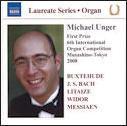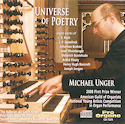 Michael Unger - Organ Recital
Michael Unger - Organ Recital
Michael Unger
Naxos 8.572246
 Universe of Poetry
Universe of Poetry
Michael Unger
Pro Organ CD 7235 (www.proorgano.com)
Devotees of organ music are admittedly few but faithful. Their numbers, however slim, do sustain a modest stream of recordings from both major and private labels. Canadian-born Michael Unger offers two new recordings in this genre – each very different from the other.
His Tokyo recital recording follows his 2008 International Organ competition victory there. Curiously enough, the Japanese have proven to be an enthusiastic and well-financed market for new pipe organs. Numerous concert halls throughout Japan have contracted North American and European pipe organ builders to install instruments costing millions. Nobody is certain why Asian audiences have so passionately embraced a culturally foreign form of music, but it gives dwindling numbers of organ enthusiasts in the West reason to be grateful.
The instrument is by European builder Marcussen & Son. Its tonal design seems a careful balance between the brightly voice ranks needed for the recital program’s Buxtehude and Bach as well as the 19th – 20th century French repertoire. The instrument’s scale reflects the desire to have a large and grand sound in the concert hall although one suspects the designers may have neglected to leave enough acoustic space in the hall to adequately blend the organ’s voices as cavernous churches do so well.
The treat in this recital is definitely Messiaen’s Dieu parmi nous (from La Nativité du Seigneur). Unger exploits the organ’s potential for colouristic effect and presents Messiaen with unreserved energy and brightness. The Gaston Litaize Prélude et danse fugeé is also a track worth hearing for its contemporary flavour.
“Universe of Poetry” presents Unger in a program of more traditional repertoire at Sacred Heart Cathedral, Rochester, N.Y. The organ is by American builder Paul Fritts and is as stunning visually as it is aurally. The Cathedral’s ambient space provides a marvellous acoustic setting for the instrument. The organ is voiced brightly making it perfect for a wide range of German repertoire and reasonably suitable for some English and American composers as well, especially the more contemporary ones. 19th century French music may not fare so well, but that’s the nature of tonal design in the organ world.
Unger’s program on this disc is mostly German (Bach, Buxtehude, Rheinberger) recognizing the instrument’s strengths. The few English, French and Belgian pieces do however, come across very well.
The performances on this disc convey a sense of fun and love for the music that contrasts with the fiery showmanship of Unger’s Tokyo competition. Production values are good on both CDs but the Cathedral recording in Rochester N.Y. has the definite edge.
Alex Baran



